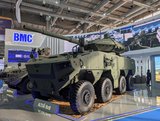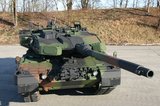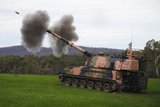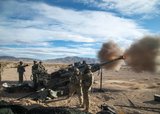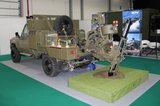First locally built KF41 Lynx IFV handed over to Hungary
Hungary’s first locally built KF41.(Photo: Hungarian MoD)
The first Hungarian-made KF41 Lynx infantry fighting vehicle (IFV) was handed over to the country’s army on 24 July after a rapid manufacturing programme which only saw the factory open in August 2023.
Another sign of the speed of the programme is that the vehicle’s manufacture was completed five months later in December before the IFV underwent what lead company Rheinmetall describes as “extensive functional inspections as well as performance and quality acceptances.”
In August 2020, the Hungarian MoD commissioned the Rheinmetall Group to supply combat vehicles and associated services worth over €2 billion (US$2.17 billion) as part of its ‘Zrínyi 2026’ initiative.
The first German-made vehicle was handed over in October 2022 and local manufacture is carried out by Rheinmetall Hungary Zrt, a joint venture between Rheinmetall (51%) and the Hungarian government (49%) in Zalaegerszeg.
In the first production phase, Hungary will receive 46 German-made Lynx by the end of 2025 but ultimately 209 KF41’s are to be provided in seven variants including IFV, C2, armoured reconnaissance, fire control and mortar carrier.
Under a separate contact placed in December 2023, a Lynx air defence variant with a Skyranger 30 turret is also being developed.
Related Programmes in Defence Insight
Related Equipment in Defence Insight
More from Land Warfare
-
![US Army plans Q2 prototype proposal request for its Mobile Tactical Cannon programme]()
US Army plans Q2 prototype proposal request for its Mobile Tactical Cannon programme
The US Army is seeking a mature 155mm, wheeled, self-propelled capability to replace the towed M777 howitzer in the Stryker, Mobile and Infantry Brigade Combat Teams as it targets a potential 498-unit acquisition goal.
-
![British Army’s Project Stokes 120mm mortar bids due in March 2026]()
British Army’s Project Stokes 120mm mortar bids due in March 2026
Project Stokes could see a new 120mm mortar capability enter British service, with domestic production and international partnerships central to competing bids.
-
![MKJ Warrior Series — The Nett Warrior Qualified Connector for Today’s Soldier Systems]()
MKJ Warrior Series — The Nett Warrior Qualified Connector for Today’s Soldier Systems
ITT Cannon’s MKJ Warrior connectors are designed for the harshest environments, delivering mission critical comms, navigation and USB data/power.









